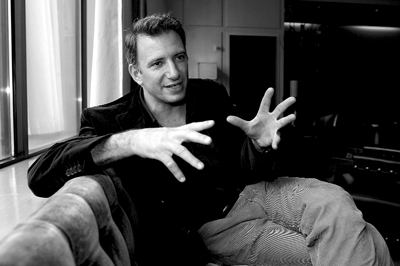By Rania Richardson
Wine seen as beverage, status symbol and commodity
“Wine is beautiful,” says Jonathan Nossiter, in New York recently to promote “Mondovino,” his new documentary on the wine industry that premiered at the 2004 Cannes Film Festival. “It’s the only product on earth as expressive in its complexity as humans are.” Barely gray at the temples and in his early 40s, Nossiter discusses the film, politics and his beverage of choice, in a quiet bar in Soho. Articulate and opinionated, it becomes apparent that the director lives his life to follow his convictions.
“I was able to sneak — no, sneak is the wrong word — to live inside of the scene of all of the players,” says Nossiter, referring to the adventure he had making a film with the artisans and businessmen, peasants and billionaires, seasoned players and green upstarts who make up the Dickensian cast of characters who weigh in on the current state of the wine business.
“I started to feel early on when I was shooting that I was getting an unusually privileged glimpse of what was going on,” continues Nossiter, who is trained as a sommelier and has created wine lists for restaurants such as Balthazar, Rice and Café Gitane. His wine lists for Il Buco and Tapas Bar earned him the Wine Spectator Award of Excellence.
Despite his knowledge and love of wine, he did not seek to make a film as a connoisseur, but as a social commentator observing globalization through the eyes of vintners and wine experts from France, Italy, the United States, Argentina and Brazil. Shooting the film with a small digital video camera allowed him to travel inconspicuously. He considered the camera to be an extension of himself as he navigated the wine world as an insider, opening up a provocative dialogue on some of the industry’s current issues.
One dispute, at the heart of “Mondovino,” has opposing factions wrestling for superiority. In one corner we see the likes of Napa Valley’s Robert Mondavi Corporation, fairly inventing wines in the laboratory, designing them for uniformity and mass appeal. In the other, we see artisanal growers struggling to protect the uniqueness of their product while maintaining solvency. “It takes a poet to make a great wine,” says the elderly Aimé Guibert, a smalltime producer in Languedoc.
This story can be seen as a metaphor for Europe trying to preserve a relationship with the U.S. and the rest of the world while maintaining and asserting a distinct identity. But in the grand scheme, the film encapsulates the commercialization and homogenization going on worldwide via marketing, with the United States at its epicenter. “It’s mass propaganda designed to distort the truth and make people behave in a herd mentality. In the 1930s it was used for ideological purposes, now it’s used for economic ones,” says the filmmaker.
That wine is a status symbol, enjoyed by an elite few is a concern for Nossiter. It should be enjoyed by everyone and at every price point. “I’d rather spend a few bucks on a Vino Verde [an effervescent Portuguese white] than 30 bucks on a Chardonnay from California that is just a symbol of prestige. Absolutely!” he says.
Nossiter is pleased to learn that he is being interviewed for The Villager, with its focus on the community and its readership of activists. Fifteen years ago, he moved to an apartment on Prince and Elizabeth Sts. and enjoyed being among Dominicans, Italians and Chinese. Now indignant that the neighborhood has “turned into consumer madness,” he avoids using the trendy moniker Nolita to describe his former locale. Awaiting the imminent birth of twins, he and his wife are now living in Brazil, while he prepares for his next film, a political sex comedy.
As the quintessential global nomad, Nossiter says he could feel at home in any country, as long as it is willing to tolerate him. “I mean that in a personal sense, but also in the larger one,” he says. “I’m worried about the growing intolerance in this country. The values I so admired in this country have been systematically destroyed by first Reagan and now Bush. They stripped historic laws that protected us citizens from abuse, regarding civil liberties and antitrust.” He sees the Reagan presidency in the 1980s as the end of creativity on many fronts.
“American wine in the ’70s was like movies in the ’70s. They were fabulous! Experimental! Filled with life and vigor and courage and diversity and color with a kind of irrepressible American energy and curiosity! Wine and movies were both fully alive. Cassavetes. Monte Hellman. Arthur Penn in ‘Night Moves.’ Coppola of the first two ‘Godfathers’….”
Clearly an influence on his thinking was his father, Bernard Nossiter, the progressive writer and former economic reporter and correspondent for The Washington Post and The New York Times. An upbringing in Europe and India, where his father was assigned, equipped him with international language skills. The multilingual filmmaker is credited with subtitling the French/Italian/Portuguese/Spanish and English language “Mondovino” himself.
Nossiter’s first feature, “Sunday,” the story of a fleeting romance between two strangers, won the 1997 Sundance Film Festival’s Grand Jury Prize. Located in Queens, the story is set amid a diverse immigrant population and has a soundtrack of world music. British actor David Suchet stars as a Jewish New Yorker. “Signs and Wonders,” Nossiter’s second feature from 2000, was shot in Athens, Greece, and stars the Swedish Stellan Skarsgard, British Charlotte Rampling and Greek Dimitri Katalifos. An international flair, skillful acting and sexy cinematography, make both of these psychological thrillers worth a viewing on home video.
As the worldliest of all American independent directors, Nossiter integrates a global consciousness into his films and infuses them with a multicultural landscape. International casts and disparate locales are as organic to his fiction features as they are to his documentaries. Attendant themes of identity and alienation resurface time and again for this auteur, who exemplifies the increasingly shrinking world we live in.





































